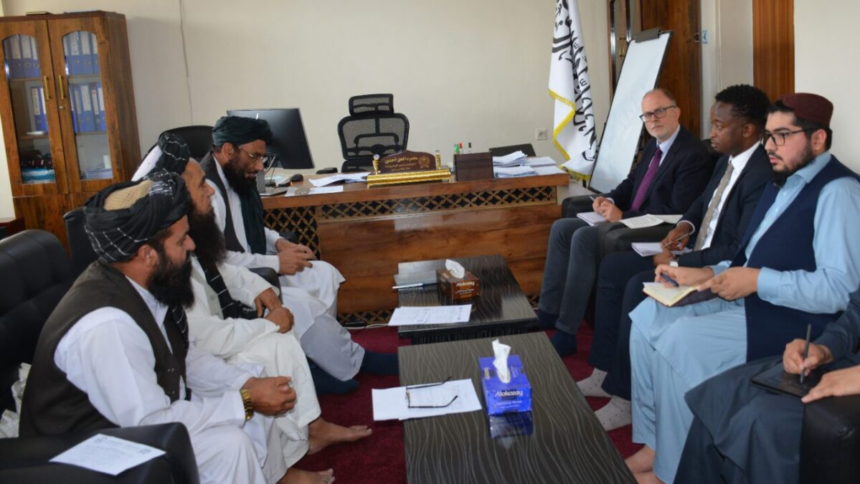RASC News Agency: As the relentless wave of deportations of Afghanistani refugees from Iran and Pakistan escalates, Afghanistan is plunging deeper into a humanitarian emergency one that is increasingly slipping beyond the Taliban’s ability to contain. Recent developments underscore the gravity of the situation: each day, thousands of Afghanistani nationals many of them women and unaccompanied children are forcibly expelled and returned to a country plagued by poverty, insecurity, and a collapsed public service system. With no reintegration infrastructure in place, these returnees face a bleak future, stranded at border crossings with little more than desperation.
Faced with mounting pressure, Taliban officials have sought diplomatic engagement. In recent days, they reportedly initiated talks with Iranian and Pakistani authorities to plead for a halt or reduction in the mass expulsions. On Monday, July 28, the Taliban’s Ministry for Refugees and Repatriation announced a meeting held in Kabul with Alistair Burnett, head of the United Kingdom’s humanitarian affairs division. In a statement issued after the meeting, Taliban representatives urged the international community to provide immediate humanitarian support, highlighting acute shortages in housing, employment, and basic aid for returnees. While the language of diplomacy dominated official messaging, the underlying tone revealed something more significant: a tacit acknowledgment of the Taliban’s lack of a coherent response to a spiraling national crisis.
This diplomatic outreach, rather than projecting strength or strategy, exposed the regime’s deep administrative fragility. The Taliban leadership, often consumed by ideological dogma and rigid authoritarianism, appears unprepared to manage one of the region’s largest refugee reintegration crises in recent history. Simultaneously, independent reports confirmed that mass deportations from both neighboring countries have intensified. Thousands of Afghanistani refugees, some of whom had lived in Iran and Pakistan for decades, are now being uprooted many without prior notice, legal recourse, or access to protective mechanisms.
Particularly harrowing is the fate of children. A significant portion of those being expelled are minors, unaccompanied and vulnerable, thrust into Afghanistan with no family, shelter, or future. In Iran, deportations are frequently accompanied by violence and intimidation. In Pakistan, disturbing accounts have emerged of police breaking into homes to arrest migrants, including individuals in the middle of asylum proceedings or awaiting migration to Europe. The Taliban’s meetings with foreign envoys, while framed as efforts to secure humanitarian relief, also reflect the regime’s escalating confusion and loss of control. These discussions offer no tangible solutions, only diplomatic theater masking a governance vacuum.
In a revealing statement, Mahmood-ul-Haq Ahadi, Director of Planning and Policy at the Taliban’s Ministry for Refugees, claimed that “global aid lacks balance.” Yet, his remarks read less as a critique of international donors and more as an inadvertent admission of the yawning gap between the Taliban’s policy ambitions and the grim realities on the ground. The United Nations has previously warned that mass returns could trigger a humanitarian catastrophe. Those warnings have now materialized. Afghanistan is confronting an unprecedented convergence of crises: economic collapse, rising unemployment, the suspension of international development funding, and an influx of returnees without support structures.
In this context, the Taliban’s outreach to foreign diplomats appears to be little more than an attempt to shift blame while evading responsibility. With no functional state apparatus to provide services and a foreign policy rooted in isolationist dogma, the regime is unable to deliver even the most basic humanitarian assistance to its people. Afghanistan today stands at the brink of total societal breakdown. The Taliban’s obsession with ideological conformity at the cost of planning, governance, and diplomacy has exacerbated the suffering of millions. While Kabul hosts formal meetings behind closed doors, the borders remain choked with displaced children, desperate mothers, and elderly citizens stripped of dignity and security.
The Taliban’s inability to respond meaningfully to this crisis reveals more than administrative weakness it exposes a regime structurally unfit to govern, incapable of mobilizing internal or external resources, and unwilling to admit the consequences of its authoritarian, exclusionary rule. As the world watches, Afghanistan’s humanitarian nightmare deepens not because of natural disaster, but due to the political and moral failure of those who claim to rule it






